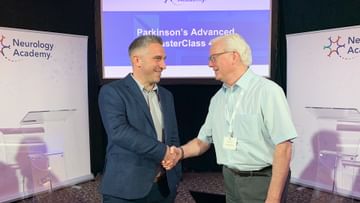Pragmatic research: making studies deliverable
KnowledgeFor a number of years we have received feedback at the Parkinson’s Academy about including sessions about research. Taking these responses and working with The Cure Parkinson’s Trust(CPT) and NIHR leads Dr Camille Carroll, Professor Oliver Bandmann and the Academy’s Dr Peter Fletcher, we designed the Research Engagement meeting for professionals who are becoming or aspire to become involved with Parkinson’s research on many different levels. Each week we are posting a blog to look at the meeting’s speaker sessions in more detail.
Pauline Fitzell, Torbay Hospital
The team in Torbay is set up to recruit into NIHR adopted studies in multiple disease areas, and it is only now they are setting up a portfolio of Parkinson’s studies with the Parkinson’s Disease Nurse Specialist as PI.
Pauline explained in Torbay there were no trials and patients were missing out. The Parkinson’s consultants were not engaged in research, nor had any interest in getting involved.
‘I really felt like our patients were being left out. It was that unfairness that was my driver to try and set up more research in Parkinson’s.’
However, the Parkinson’s Disease Nurse Specialist was keen and eventually they found a phase II study that would accept a Nurse PI (PD-Stat being led from Plymouth by Dr Camille Carroll). In spite of having limited resources, the team identified their requirements and critically trained the PD rater for the trial.
Mapping the local patient population was key. Torbay has an elderly population, as many have chosen to retire to the area. Fortunately, PD-Stat includes PwP up to the age of 80 (many trials exclude people over the age of 65 or 70). Interestingly the NIHR has a current interest in exploring how to involve underserved communities in research.
‘Research can reduce death rates and it also improves your CQC outcomes. So why are we not doing it?’
Pauline stressed that the Torbay team has specialism in recruiting to trials; all they needed was to add on the Parkinson’s specialism. Pauline’s presentation provoked an interesting discussion about the need for PA support for everyone taking on research. The local CRN has Greenshoots funding to support initiatives like that in Torbay
The morning session had focused on a number of clinician’s experiences on getting involved in research, as well as the variety of clinical research that is currently ongoing. A number of themes emerged presenting research as a positive experience; yes there are some pitfalls to be avoided, but there are resources and more importantly people available to mentor, guide and help deliver research that is relevant for patients. For the PI there needs to be an adaptability, determination and resourcefulness, but working in a team makes the impossible …. possible.
Listen to this presentation:
Related articles
'The things you can't get from the books'
Parkinson's Academy, our original and longest running Academy, houses 23 years of inspirational projects, resources, and evidence for improving outcomes for people with Parkinson's. The Academy has a truly collegiate feel and prides itself on delivering 'the things you can't get from books' - a practical learning model which inspires all Neurology Academy courses.


